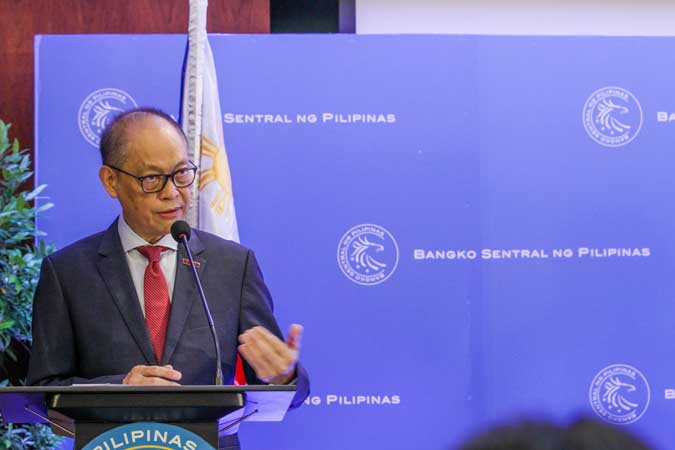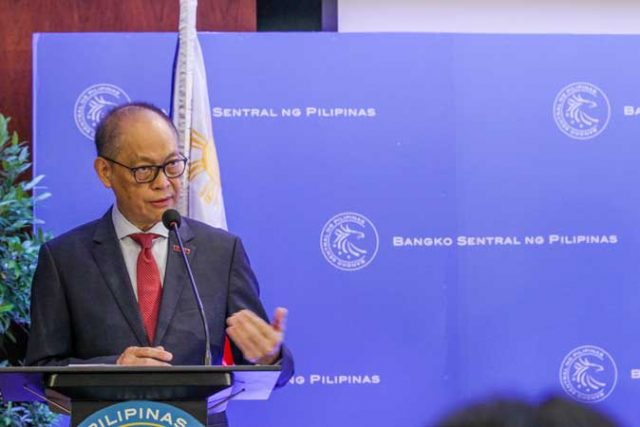
BSP chief keen on keeping accommodative policy – BusinessWorld

THE central bank is committed to maintaining an accommodative monetary policy while the economy is starting to recover from the coronavirus pandemic, Bangko Sentral ng Pilipinas Governor (BSP) Benjamin E. Diokno said.
“[I]’m comfortable that we will continue to be supportive of the economy, given that the economy is still at its nascent recovery phase,” he said in an interview with ANC on Monday.
The Monetary Board maintained the key policy rate at an all-time low of 2% at its June 24 meeting, citing the need to support the economy as the coronavirus continues to be a threat.
Mr. Diokno expects the economy to have fared better in the second quarter as strict lockdown restrictions were eased.
“I think we’ll see a big positive for the second quarter, [and] there will be a strong second half of the year. And so, let’s see from there whether we will make some adjustments in our policy,” he said.
The central bank has four more policy reviews this year, with the next one set on Aug. 12.
Mr. Diokno also noted the US Federal Reserve’s eventual policy tightening is unlikely to pose a problem for the Philippines, thanks to its ample dollar reserves.
“We have hefty gross international reserves and we have multiple sources of foreign exchange coming in. We have OFW remittances, BPO receipts, and foreign direct investments continue to come in. So I’m not worried of the Fed’s interest rates going up,” the BSP chief said.
Meanwhile, ING Bank N.V. Manila Senior Economist Nicholas Antonio T. Mapa said the economy’s growth likely picked up in the second quarter from a year ago, although mainly due to low base effect.
To recall, the economy shrank by 16.9% in the April-June period last year as nearly all economic activity was halted during the strictest lockdown in Luzon.
“On a quarter-on-quarter basis, we expect gross domestic product (GDP) to actually be negative in the second quarter, due to renewed lockdowns, with successive quarter-on-quarter growth numbers not likely to revisit the highs enjoyed in the second half of 2020,” Mr. Mapa said in an e-mail.
The country’s GDP shrank by 4.2% in the first quarter of 2021.
Mr. Mapa said monetary stimulus will still be needed as GDP growth will likely be “modest” in the coming quarters. A rate hike could harm the growth momentum and further delay recovery, he added.
The government expects the economy to grow by 6-7% this year, although multilateral lenders and think tanks flagged downside risks arising from another possible virus surge and the sluggish vaccine rollout.
“With bank lending negative for six months and counting, consumer confidence still deep in the red and unemployment well-above pre-pandemic norms, we do contend that the economy is in need of all the help it can get,” Mr. Mapa said.
Bank lending, which supports capital formation or the investment component of an economy, declined by 4.5% in May following the 5% fall in April.
‘GRAY LIST’ EXIT
Meanwhile, Mr. Diokno, who is also the Anti-Money Laundering Council (AMLC) chairman, said it may take the Philippines 18 months to exit the Financial Action Task Force’s (FATF) “gray list” or by January 2023, as the upcoming elections may have an impact on anti-money laundering and counter-terrorism financing (AML/CTF) efforts.
“You know the wildcard here why it will take 18 months is because there is an intervening election next year. We could comply with this within say, one year, but we expect some changes in the officials of law enforcement agencies like the PNP (Philippine National Police), the NBI (National Bureau of Investigation), and PAGCOR (Philippine Amusement and Gaming Corp.), for example, we provided for that,” he said.
On June 25, the FATF placed the Philippines on its gray list, as it saw deficiencies in the country’s AML/CTF framework.
The AMLC recently issued new rules related to handling freeze orders and raising red flags for transactions of newly covered sectors including the real estate industry.
“The compliance of covered persons with the AMLC Registration and Reporting Guidelines contributes to addressing the International Co-operation Review Group action plan item that all relevant supervisors of designated nonfinancial businesses and professions (such as real estate developers and brokers) should demonstrate risk-based AML/CTF supervision of covered sectors through onsite and offsite examinations and enforcements measures,” AMLC Executive Director Mel Georgie B. Racela said in a Viber message.
Gray-listed countries are required to regularly submit progress reports to show their progress in implementing AML/CTF measures. For the Philippines, its first progress report to the FATF is due in September. — L.W.T.Noble
Stay connected with us on social media platform for instant update click here to join our Twitter, & Facebook
We are now on Telegram. Click here to join our channel (@TechiUpdate) and stay updated with the latest Technology headlines.
For all the latest Education News Click Here
For the latest news and updates, follow us on Google News.

